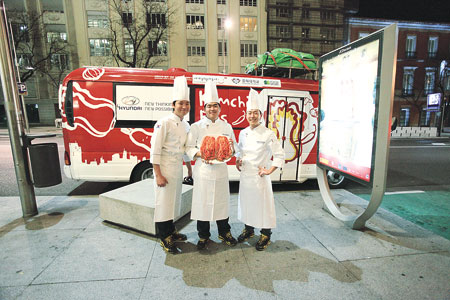Three culinary arts students introduce kimchi to world

Kim Seung-min, left, Jo Seok-beom, center, and Ryu Si-hyeong pose in front of their “kimchi bus” at the Madrid Fusion 2012, a high-profile international summit, in the Spanish capital on Jan. 20, 2012. (Photo : The Korea Times/Jo Seok-beom)
Do kimchi and buses mix? For three culinary science students from the tourism college of Kyung Hee University, the answer is yes.
Ryu Si-hyeong, 29, Kim Seung-min, 29, and Jo Seok-beom, 25, have remodeled their “kimchi bus” and driven some 50,000 kilometers across Europe and North America to promote Korean food culture. They traveled to 130 cities in 26 countries over about 400 days, starting in Oct. 2011.
The idea was born from Ryu’s idea to promote kimchi to people around the world. In 2006, he purchased a one-way ticket to London with no definite object while attending Kyung Hee University. He made money by working at a paint shop and a restaurant, and traveled round Europe for 220 days. He published a book called “26 Euro,” based on his experience.
When he returned to Korea, he formed the plan for the kimchi bus with classmates Kim and Jo. After contacting many companies for sponsorship, they succeeded in receiving 150 million won from Hyundai Motor and clothing from Kolon Industries. They bought a bus installed with a bathroom, kitchen, and sleeping space for 30 million won and started the first operation of the kimchi bus at the 18th Gwangju World Kimchi Culture Festival in 2011. Then on Oct. 23, 2011, they departed for Vladivostok, Russia, participating in many festivals and hosting tasting events of kimchi-based food.
“At first, we thought it would be interesting but there were many difficulties. The hardest moments were when our worn-out kimchi bus broke down, which happened many times,” said Kim. They took part in Madrid Fusion 2012 in Spain, a high-profile international culinary summit, after traveling through Russia, Ukraine, Poland, and Austria before heading on to Western Europe.
“Europeans often gave up on seeing the red color of kimchi. They thought they couldn’t eat such red hot food. Each time, we made various dishes using kimchi, such as “kimchijeon” (Korean style pancake), kimchi borscht made by combining borscht (traditional Russian food), and kimchi pasta,” said Jo.
“In America, there was less resistance as many Koreans live there but in Europe we had difficult times as there were many people who even didn’t know about Korea. The interesting point is that though they expressed unfamiliarity, they accepted kimchi as Korean culture,” said Ryu. He added that they didn’t try to make a Westernized version of kimchi, which is less spicy or sweeter. They just made it in the traditional Korean way so that they could let Western people know more about Korean food culture.
From Germany, they went to North America and joined the Korus Festival which was held to promote harmony between Korean-Americans and Americans, put on by an association for Korean residents in Washington, D.C. At that festival, they demonstrated the kimchi-making process.
Ryu, the leader of the kimchi bus said, “Cooking is culture. Regardless of language, there exists universal taste. We came to know that everyone feels delicious food is delicious. Though we can only speak English to non-English speakers we explained using gestures, we communicated through food.”
They plan to drive the kimchi bus to the flea market in Nonhyeon-dong, Seoul on Jan. 12 to sell kimchi and kimchi fusion foods. They have a lot of work to do. “We don’t want to stop here. We are planning to hold a nationwide tour with our kimchi bus. We are also developing many fusion foods and will publish a book based on our experiences,” Ryu added. <The Korea Times/Baek Byung yeul>






















































